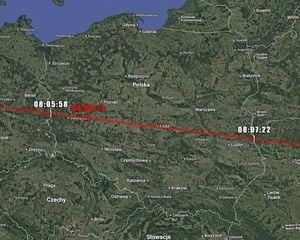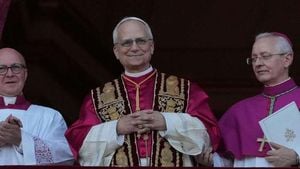On January 30, 2025, the highly anticipated historical drama "Zloy Gorod" ("Evil City") premiered across Russia, bringing to life the lesser-known yet pivotal siege of Kozelsk during the Mongol invasion led by Batu Khan. Directed by Konstantin Buslov, known for his previous works such as "Kalashnikov" and "1941: Wings Over Berlin," the film aims to shed light on the resilience of the Russian spirit and the historical significance of this event.
Set against the backdrop of 1238, the film intricately portrays the heroic defense by the inhabitants of Kozelsk, who withstood the assault of the powerful Mongol army for two months. Often overshadowed by other historical battles like the Kulikovo Field, this story offers viewers insight not just to the strategic military maneuvers but also to the emotional and personal struggles faced by the defenders.
The narrative centers around several key characters, including the valiant Aba (played by Aleksey Guskov) and the spirited female warrior played by Leonela Manturova, whose character's transformation from victim to hero serves as one of the film's emotional cores. “After two months of siege and battle, where the Horde lost one thousand men, Batu decided not to retreat and erase the name Kozelsk from human memory,” states the film's backdrop, pointing to the historical anger and determination of Batu, who speaks to the wider themes of conflict and resistance.
"Zloy Gorod" is not just about the battle itself; it reflects on human character, sacrifices, and the motivations of both the defenders and their attackers. Buslov emphasizes the film’s goal of presenting complex and relatable characters rather than one-dimensional portrayals of good and evil. “We aim to depict historical events with sensitivity, avoiding stereotypes and providing depth to our characters,” said Buslov.
To achieve this, extensive research was conducted. The film was made with the support of the Cinema Fund and produced with considerable resources, estimating its budget around 830 million rubles. Audiences can expect gripping battle scenes, detailed recreations of medieval life, and costumes carefully crafted from natural fabrics to reflect the period authentically. According to reports, the production involved constructing life-sized sets replicative of the medieval fortress of Kozelsk, complete with defensive structures like wooden homes and fortifications, showcasing the creativity and effort behind this cinematic endeavor.
Characters like Ratsha embody the duality of human nature within the conflict, as he grapples with his past allegiances. Transitioning from a warrior to a monk, Ratsha's conflicting identities reflect real historical ambiguity, described by critics as integral to the storyline. “The character of Ratsha is depicted as both a traitor to Russians and the Mongols and evolves throughout the narrative,” reports cited by various media outlets.
Critics have begun to weigh in on the film, with initial reactions praising its visual prowess and the depth of storytelling. Some noted, “The historical details are well-maintained, and costumes are superbly crafted, creating a visually stunning experience,” though others hoped for more nuanced storytelling to match the grand visuals. This kind of dialogue encapsulates the film's aspiration not just to entertain but to inspire discourse about national identity and collective historical memory.
"Zloy Gorod" invites its viewers to witness the power of fortitude amid despair, fidelity, and sacrifice as the people of Kozelsk band together against overwhelming odds. With its emotional heft and visual sophistication, it seeks to resonate with modern audiences and reflect on the enduring legacy of historical events, capturing the spirit of Russian resilience through cinema.
The film will be shown nationwide, drawing large crowds eager to witness this artistic endeavor and engage with the narratives of their heritage. It promises to be more than just another historical retelling, aspiring to etch itself firmly within the annals of Russian cinema and public consciousness.



